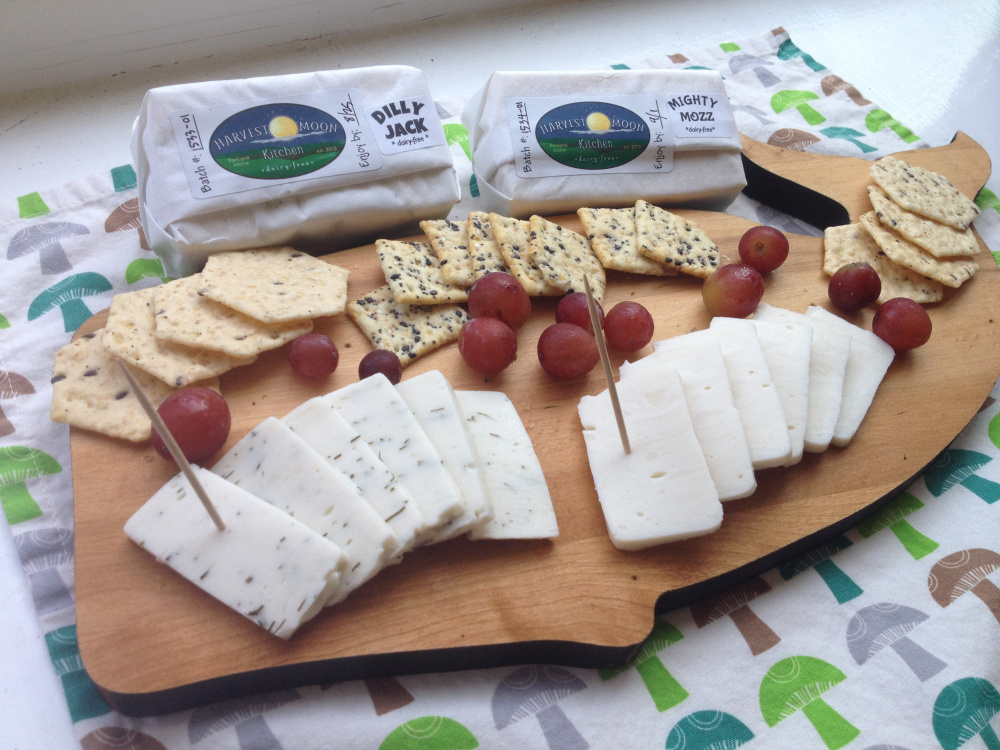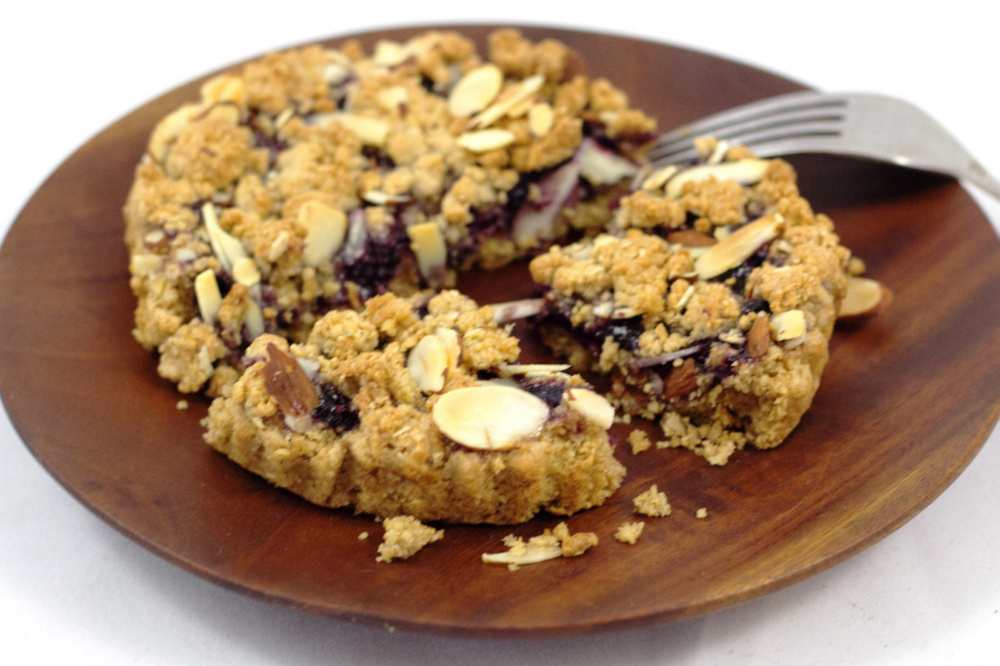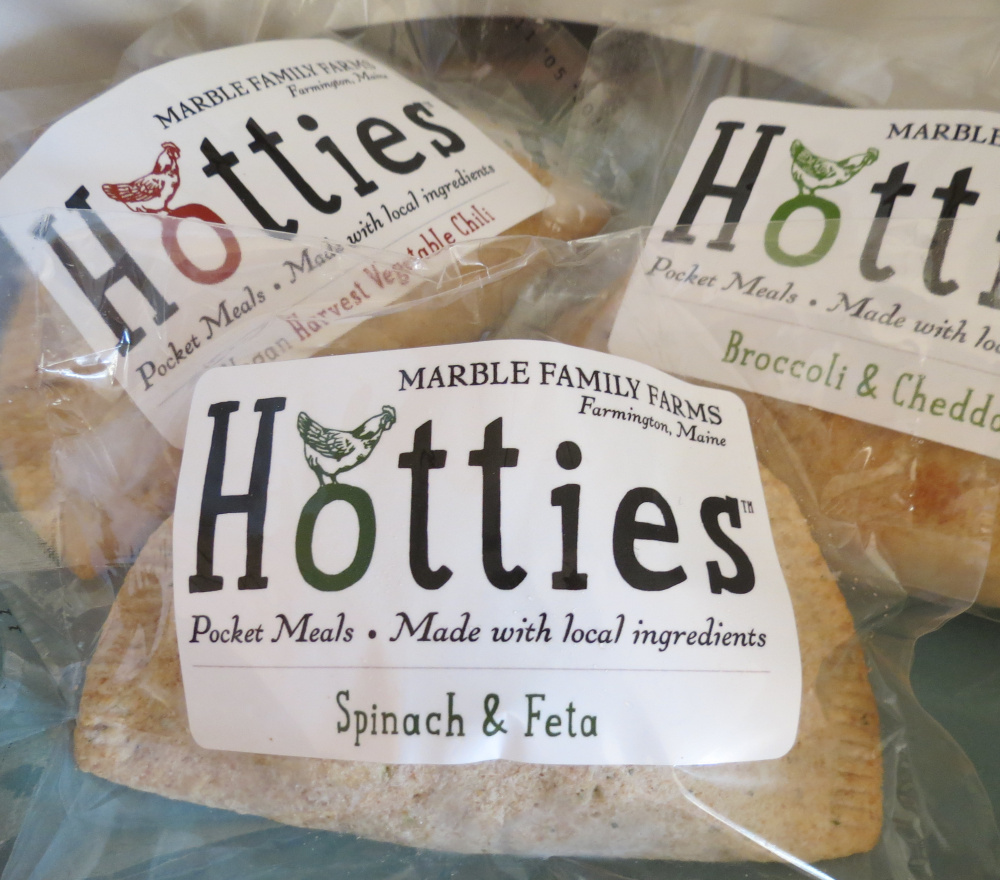The holidays are closing in, and if you still have a vegetarian or someone leaning toward a plant-based diet on your shopping list, a food-related present is always a good choice. To aid in your gift quest, I offer eight ideas: four new to the market of Maine-made vegetarian foods; one must-have kitchen tool for new vegetarians and novice cooks; and three splurge gifts for that special vegetarian in your life who deserves a post-holiday getaway.
NEW AND LOCAL
• HARVEST MOON KITCHEN DAIRY-FREE CHEESE
Suggested retail price: $8.99
The world of cultured vegan cheese continues to expand, and now Maine has its own locally made version to give or for a non-dairy cheese platter. Julie Marsh of Gorham launched the business in August and works out of a commercial kitchen in Portland. The creamy, sliceable and spreadable cheeses are handcrafted from organic soy milk, coconut oil and tapioca flour and sold in 5-ounce packages. Marsh said she “wasn’t satisfied with the commercial dairy-free cheese options on the market, so I began making my own.” She makes three flavors – Mighty Mozz, Dilly Jack and Smoky Jack – and look for a hot pepper variety in the new year. You can find the cheeses at the Portland Food Co-op, Lois’ Natural Marketplace, Royal River Natural Foods and Morning Glory Natural Foods.
• HOTTIES HAND PIES
Suggested retail price: $3.85
Savory and portable, hand pies are a popular trend. Now the team at Marble Family Farms in Farmington has brought a line of Maine-made hand pies to market. Called Hotties Hand Pies, the three vegetarian varieties are Spinach & Feta, Broccoli & Cheddar and Vegan Vegetable Chili. Encased in a flaky, whole-wheat crust, the pies are pre-baked and sold frozen to be warmed and eaten on the go. Most of the ingredients are locally sourced and/or organically grown.
You can also rest easy knowing that (according to the website) “each Hottie is personally massaged and whispered to before being gently placed onto a sheet pan to rest. Once transfixed into a state of relaxation, Hotties are quickly thrown into a fiery convection oven to permanently seal in all feelings of happiness and joy.” Find them at health food stores and local markets throughout the state and for sale from the Hottie-mobile at summer festivals.
• THIRTY ACRE FARM FERMENTED HOT SAUCE
Suggested retail price: $6.50
Known for its lacto-fermented sauerkraut and kimchi, this Whitefield-based farm has a new hot sauce with a wildly tasty flavor. Like all of the certified organic Thirty Acre Farm products, the hot sauce contains beneficial digestive bacteria (a result of the lacto-fermentation process, which involves no vinegar, whey or sugar). Only four ingredients go into this hot (but not super-hot) sauce: tomatillos, hot peppers, garlic and sea salt. The sauce works well in a range of cuisines and dishes, such as burritos, salad dressings, soups, pasta, stir-fries and dips and spreads. Look for it in health food stores, co-ops, local markets and at the Thirty Acre Farm booth at the Portland Winter Farmers’ Market.
• O.A.T. CRUMB TARTS
Suggested retail price: $3.75
Oats Any Time (O.A.T. for short) vegan and gluten-free sweet treats pack in a lot of nutrition with an ingredient list that includes steel-cut oats, cashews and almonds. I’ve enjoyed them with mid-morning coffee, as an afternoon pick-me-up and for dessert. Each substantial tart tastes good and keeps hunger at bay. The tarts, made in Newport, come in more than a dozen varieties, including Maine wild blueberry (the most popular), caramel apple, sweet cinnamon pear, rhubarb-cranberry, pumpkin, caramel chocolate and Michigan black cherry. Find the tarts online (where you can buy gift packs) and at Coffee By Design, Nina’s Variety, Bow Street Market and She Doesn’t Like Guthries.
UNGLAMOROUS BUT OH-SO-HANDY KITCHEN TOOL
• A FINE-MESH SIEVE
Around $5 to $20
It’s a low-cost, common kitchen tool, so few of us think of giving a fine-mesh strainer as a gift. But we really should – especially if the recipient is a new cook or a new vegetarian. I have multiple colanders I use for rinsing fruits and vegetables, and a steamer basket I use for cooking vegetables. However, it is my fine-mesh strainer that I use every day and often multiple times a day. Sure, it can be used to rinse fruits and vegetables, but its true beauty is in rinsing dry grains and bean. Larger beans can be rinsed in a colander, but I find the handle on my sieve makes it easier to quickly rinse and then pour the beans into a pot before cooking or soaking. Spiralizers, ice cream makers and pasta machines make excellent gifts, but few of us use them every day. Since the foundation of a vegetarian diet is beans and whole grains, a fine-mesh strainer will be put to good use.
PLANT-BASED GETAWAYS
• VISIT TO SOAKOLOGY SPA IN PORTLAND
Soaks start at $35 and packages range from $80 to $200
Whether the vegetarian on your list has tender toes or simply deserves some post-holiday de-stress time, a visit to Soakology can work wonders. Choose from fragrant soaking baths such as Maine forest, tension relief, clarity of mind and chocolate & mint. Head, neck, lower arm and foot massages are also available, as is reflexology.
Spas have long been a source of quality vegetarian eats, and Soakology follows this tradition by offering a fully vegetarian menu of small plates, both savory (hummus, chevre, cucumber tea sandwiches) and sweet (chocolate, French macaroons). The extensive tea menu includes oolong, chai, pu-erh, yerba mate and herbal teas.
• COOKING CLASS FROM FRINKLEPOD FARM IN KENNEBUNK
$40 per class
Get to know vegetables with farmer Flora Brown, who offers a regular series of plant-based cooking classes at The New School in Kennebunk. Each is geared to new cooks and those new to vegan cooking. Classes, which run from 6 to 9 p.m., emphasize simple techniques and use whole, unprocessed ingredients. Upcoming classes include The Meat-Free Kitchen (Jan. 19), The Egg-Free Kitchen (Feb. 16) and The Cheese-Free Kitchen (March 15).
• RETREAT AT THE KUSHI INSTITUTE IN BECKET, MASSACHUSETTS
$975 for weeklong program and meals; lodging is extra
The renowned Kushi Institute in the Berkshires is one of the world’s leading macrobiotic schools. Its weeklong Way to Health programs are offered once a month and feature cooking classes, health lectures, exercise programs and three macrobiotic meals a day.
The cuisine is centered on whole grains and vegetables and is largely vegan, with the exception of an occasional fish dish. Macrobiotic food is popular among people healing from cancer or other serious diseases, while others enjoy it as a way to maximize and maintain health.
Avery Yale Kamila is a freelance food writer who lives in Portland. She can be reached at:
Twitter: AveryYaleKamila
Send questions/comments to the editors.






Comments are no longer available on this story